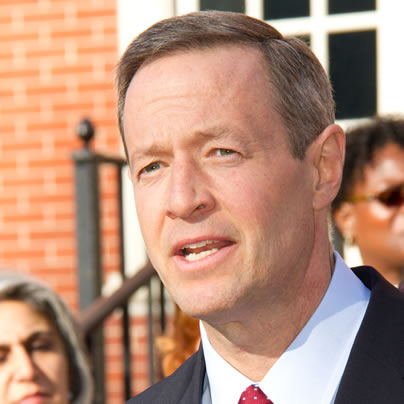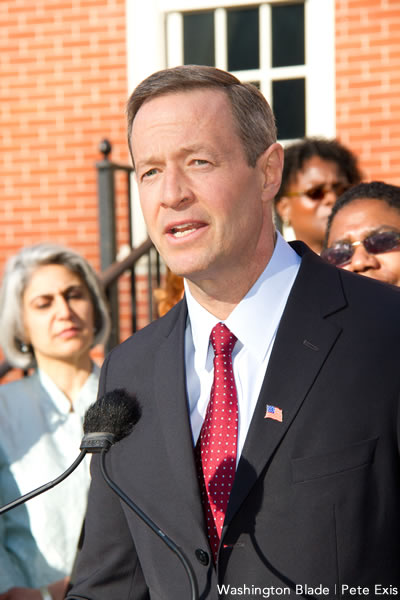Local
Will casino push impact Md. marriage referendum?
Polls suggest gaming will have little impact, but others say it’s a ‘crap shoot’

As Maryland lawmakers prepare to debate the proposed expansion of gambling in the state, same-sex marriage supporters are divided over whether the issue will influence the outcome of the November referendum.
Josh Levin, campaign director of Marylanders for Marriage Equality, pointed to a Maryland pollster who said in an undated memo that a referendum, no matter “how controversial,” would not “by itself drive up turnout among ‘reluctant’ voters in a presidential year.” The memo specifically notes that 2,631,434 Marylanders voted in the 2008 presidential election, compared to only 2,525,424 who cast votes in the gaming referendum that allowed five casinos with slot machines and table games on video screens to open in the state. (Voters approved Question 2 by a 58.6 to 41.4 percent margin.)
The Washington Post last month noted that a second poll of 700 Maryland voters that the Mellman Group conducted on behalf of MGM Resorts International between June 28 and July 7 found 63 percent of gambling proponents support same-sex marriage. The survey found that only 34 percent of those who oppose gaming are against nuptials for gays and lesbians. MGM is seeking rights to build a proposed National Harbor casino.
“Both issues are going to motivate voters to get out on both of the issues,” said Levin, referring to the Mellman Group survey. He spoke to the Blade hours after Gov. Martin O’Malley, who signed the same-sex marriage law in March, announced a special legislative session to decide the fate of the proposed National Harbor casino in Prince George’s County that will start on Aug. 9. “Where we have the momentum, we don’t see it affecting turnout in ways that will be harmful to us.”
Neither O’Malley’s office nor the Maryland Family Alliance, the group that backs the November same-sex marriage referendum, returned the Blade’s requests for comment.
Some LGBT advocates fear that the group of existing Maryland casino operators will target conservative blacks and white evangelicals who traditionally oppose gambling — and same-sex marriage — in a well-funded campaign against the proposed National Harbor complex. A separate referendum on the Maryland Dream Act that would extend tuition to undocumented immigrants further complicates the electoral landscape.
“It’s a tricky question because gambling and marriage have never been on the ballot together in Maryland,” said Jeff Krehely, vice president of LGBT programs at the Center for American Progress. “Knowing there could be a morality argument against gambling, I feel like having any kind of gambling effort on the ballot is going to increase those with a more conservative perspective on the world to come out to the ballot referendum.”
A Gonzalez Research and Marketing poll in January found the economy, jobs, education and taxes — and not same-sex marriage — were the top issues among Maryland voters. Less than one percent of respondents identified nuptials for gays and lesbians as their biggest concern.
Only 19 percent of those who took part in the annual Conservative Political Action Committee straw poll in D.C. in February described “traditional values” as their top issue going into this year’s election cycle. Only 1 percent of those who voted in the 2011 CPAC straw poll cited stopping same-sex marriage as their primary concern.
In spite of these numbers, some Maryland LGBT activists are not ready to discount the impact a gambling referendum could have on efforts to defend the state’s same-sex marriage law.
“At this point it’s a crap shoot,” the Rev. Meredith Moise, co-chair of Baltimore Black Pride, told the Blade. “I do know some of the pastors are organizing against the gambling pieces for good reason — focus on gaming is taking away from a lot of important issues and just the money drain it will bring to the community is unfathomable. Anytime you have something that can motivate and organize anti-gay constituencies could spell trouble for us.”
Moise noted that churches that both support and oppose nuptials for same-sex couples have joined anti-gaming efforts. She stressed that she feels these congregations “have agreed to disagree about gay marriage for the sake of their coalitions.”
Moise added that activists have found that those whom she described as allies and potential allies remain unaware of the November referendum.
“We are still educating people and having conversations about marriage equality,” she said. “LGBT folks and community activists are having conversations about marriage equality. What we are hearing and experiencing is that people know the bill passed but don’t know that it will be on the ballot in November.”
Virginia
Walkinshaw wins Democratic primary in Va. 11th Congressional District
Special election winner will succeed Gerry Connolly

On Saturday, Fairfax County Supervisor James Walkinshaw won the Democratic primary for the special election that will determine who will represent Virginia’s 11th Congressional District.
The special election is being held following the death of the late Congressman Gerry Connolly, who represented the district from 2008 until 2024, when he announced his retirement, and subsequently passed away from cancer in May.
Walkinshaw is not unknown to Virginia’s 11th District — he has served on the Fairfax County Board of Supervisors since 2020 and had served as Connolly’s chief of staff from 2009 to 2019. Before he passed away, Connolly had endorsed Walkinshaw to take his place, claiming that choosing Walkinshaw to be his chief of staff was “one of the best decisions I ever made.”
The Democratic nominee has run his campaign on mitigating Trump’s “dangerous” agenda of dismantling the federal bureaucracy, which in the district is a major issue as many of the district’s residents are federal employees and contractors.
“I’m honored and humbled to have earned the Democratic nomination for the district I’ve spent my career serving,” Walkinshaw said on X. “This victory was powered by neighbors, volunteers, and supporters who believe in protecting our democracy, defending our freedoms, and delivering for working families.”
In addition to protecting federal workers, Walkinshaw has a long list of progressive priorities — some of which include creating affordable housing, reducing gun violence, expanding immigrant protections, and “advancing equality for all” by adding sexual orientation and gender identity to the Fair Housing Act.
Various democratic PACs contributed more than $2 million to Walkinshaw’s ad campaigns, much of which touted his connection to Connolly.
Walkinshaw will face Republican Stewart Whitson in the special election in September, where he is the likely favorite to win.
Maryland
LGBTQ suicide prevention hotline option is going away. Here’s where else to go in Md.
Changes will take effect July 17

By ANNA RUBENSTEIN | The national suicide prevention hotline will no longer offer specialized support to LGBTQ people, starting July 17, the Trump administration announced last week.
Dialing the hotline at 988 will still be available for crisis support. But callers will no longer be able to reach specific LGBTQ services by pressing Option 3. The change worries advocates because their data shows the LGBTQ community has a disproportionally high suicide rate.
Even after the option ends, here’s how to receive tailored support if you’re in Maryland.
The rest of this article can be found on the Baltimore Banner’s website.
Maryland
Silver Spring holds annual Pride In The Plaza
‘Today means inclusion. It means to build resilience’

Silver Spring’s annual Pride in the Plaza event took place on Sunday to celebrate the LGBTQ community and emphasize inclusion and resilience.
“Today means inclusion. It means to build resilience, love,” Robyn Woods, program and outreach director for Live In Your Truth, which organized the event, said. “I mean, just being surrounded by the community and so many great entrepreneurs, business owners, and just being a part of this whole rainbow coalition that we call the LGBTQIA to be about.”
With the event being her first time organizing for Live In Your Truth, Woods said she felt emotional to see the support and love at the event.
“Some people (are) bringing out their children, their babies, their grandparents,” Woods said. “It’s a lot more allies here than anything else. That type of support to me means so much more than just support from my community; just outside support, inside support, so much support around it, so much love. Everyone’s smiling outside, helping each other.”
Attendees of the event were able to head over to the Family Fun Zone, an air-conditioned Pride Cool Down Lounge, or watch live drag performances in the main stage area.
Along with entertainment and a shaved-ice stand, rows of information tables stood along the plaza, including FreeState Justice, the Washington Spirit, Trans Maryland, Moco Pride Center, and the Heartwood Program, an organization that offers support, therapy, education, and resources to the LGBTQ community.
“I want people to know about our services, and I love what we have to offer,” Jessica Simon, psychotherapist for Heartwood Program’s Gender Wellness Clinic, said. “I (also) want to be part of a celebration with the community, and so it feels good to be here with other people who have something they want to give to the community.”
She added that within today’s political climate, to which she called an “antidote to shame,” it’s important to be celebrating Pride.
“There’s a lot of demonization of LGBTQI people,” Siena Iacuvazzi, facilitator for Maryland Trans Unity, said. “(Pride) is part of the healing process.”
Iacuvazzi said she was taught to be ashamed of who she was growing up, but being a part of a community helped her flourish in the future.
“I was taught how to hate myself. I was taught that I was an abomination to God,” she said. “But being a community is like understanding that there are people who have experienced the same thing, and they’re flourishing. They’re flourishing because they’re willing to stand up for themselves as human beings and discover themselves and understand what’s true for themselves.”
She added that Pride allows for a mutual understanding to take place.
“It’s more of a sense of belonging … and just taking that home and understanding you’re not alone,” Iacuvazzi said. “We’re each taking our own journey — we’re not putting that on each other. It’s just walking away with a sense of belonging and humanity.”
Similar to Iacuvazzi, Woods said she hopes attendees’ biggest takeaways would be family, fun, resilience, and pride.
“Being proud of yourself, being happy for who you are, and representation and how much it matters,” she continued. “And I think all these young people that are walking around here get to see versions of themselves, but older. They get to see so many different lesbian, gay, bisexual, pansexual people that are successful, that are showing love, that care, and it’s not how we’re portrayed in the media. It’s lovely to see it out here. (It’s) like we’re one big old, happy family.”
-

 U.S. Supreme Court5 days ago
U.S. Supreme Court5 days agoSupreme Court upholds ACA rule that makes PrEP, other preventative care free
-

 U.S. Supreme Court5 days ago
U.S. Supreme Court5 days agoSupreme Court rules parents must have option to opt children out of LGBTQ-specific lessons
-

 Television5 days ago
Television5 days ago‘White Lotus,’ ‘Severance,’ ‘Andor’ lead Dorian TV Awards noms
-

 Music & Concerts5 days ago
Music & Concerts5 days agoBerkshire Choral to commemorate Matthew Shepard’s life












